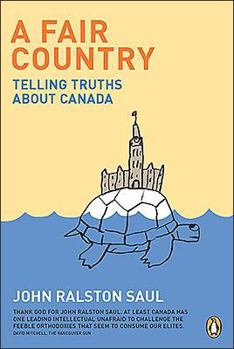A Fair Country: Telling Truths about Canada
Select Format
Select Condition 
Book Overview
In this startlingly original vision of Canada, renowned thinker John Ralston Saul argues that Canada is a M tis nation, heavily influenced and shaped by Aboriginal ideas: Egalitarianism, a proper... This description may be from another edition of this product.
Format:Hardcover
Language:English
ISBN:0670068047
ISBN13:9780670068043
Release Date:September 2008
Publisher:Viking
Length:320 Pages
Weight:1.25 lbs.
Customer Reviews
2 ratings
Where do I begin?
Published by Thriftbooks.com User , 14 years ago
Startling. Provocative. Depressing. Stirring. Confounding. Rage-inducing. Bewildering. Inspiring. All of these adjectives are befitting 'A Fair Country'. And more. (In its own bizarre way, it's a love letter to the nation.) When I lived in the UK, I would often be called upon to answer the question 'So; Canadians and Americans... What's the difference?' Having been born and raised in Canada, having lived in the US, having half my family there as residents, I felt eminently qualified to provide a fairly cogent answer. After reading Saul's book, I humbly confess that I'd been wrong. Turns out I didn't really understand much at all about Canada, its history, what it means to be a Canadian...not even how it all relates to the U.S., to being 'not American'. I won't belabour the point here by rehashing what's in the tome. My copy was dog-footed to the extreme, there were so many bits that I just had to go back to, or excerpt for friends. Suffice it to say that 'A Fair Country' is by far the most important book I've read this year, and as a Canadian, one the most important ever. It's unsettled me, forced me to look at elements of Life in Canada in entirely different ways, compelled me to re-examine my perspective. (As a screenwriter, it's even given me pause to consider Canadian history as source material, no mean feat.) 'A Fair Country' should be required reading for all Canadians. The resulting dialogue might get us up off our collective apathetic arses and into action, at long last creating the nation we're capable of realizing.
Inspiring if true, interesting if not . . . . .
Published by Thriftbooks.com User , 15 years ago
There is a fundamental flaw in this book which can be summed up in this premise: If we drink water, and since Stalin drank water, therefore Stalin must have been a democract like us. This flaw doesn't make Saul fundamentally wrong; instead, it is the flaw of assuming the commonality of certain principles means they must have been adopted from others rather than being independently invented. Saul believes, "We are a people of aboriginal inspiration organized around a concept of peace, fairness and good government." If so, then Canada must have Zuni origins. Governor Robert Lewis of Zuni Pueblo expressed the same principles to me on various occasions, as did Navajo Nation President Albert Hale. They are wise enough in the ways of people to cite common values among people rather than believing good ideas much have a common origin. Likewise, in 'Woodcraft and Indian Lore,' Ernest Thompson Seton outlines "Teepee Etiquette" which consists of many similar ideas. As a former Navajo Nation official, including serving as president pro tem, I saw many of these principles in day-to-day reality. To cite one example, the 'Dine' system of justice is based on different principles than Anglo-Saxon law which now governs much of the world. Navajo "Peacemaker Courts" are quite different than Canadian courts. If adopted, such principles would turn Canadian legal society upside down. Obviously, it is worth considering and, if adopted, might even give lawyers a good name. It is profoundly true, as Mohawk writer Beth Brant says, "We do not worship nature. We are part of it." Every modern biologist readily agrees. Does this mean the origins of modern biology are aboriginal? Or does it indicate common sense is universal? Saul is brilliant, innovative, provocative and original. If Canada adopts these principles, it will be a better society. But, his argument will make more sense if he understands universal principles which make a good society rather than suggesting Canadians are too dumb to think of such principles on their own. In many ways, it is a gem. As one of Canada's best known intellects, Saul is worth reading for his varied insights. He's inspiring if true, interesting if not and obviously the epitome of Canadian self-deprecation. It'd be much better if he had pride in Canada instead of his own cleverness. He'd do far better if he credited Canadians with using their own intelligence to develop a fine society instead of saying, "Here's some more ideas for you copycats to adopt." So why five stars? Any book that makes you think, even if your conclusions are the opposite of the author, deserves praise. What's more, perhaps Saul is right and Canada is wrong.




